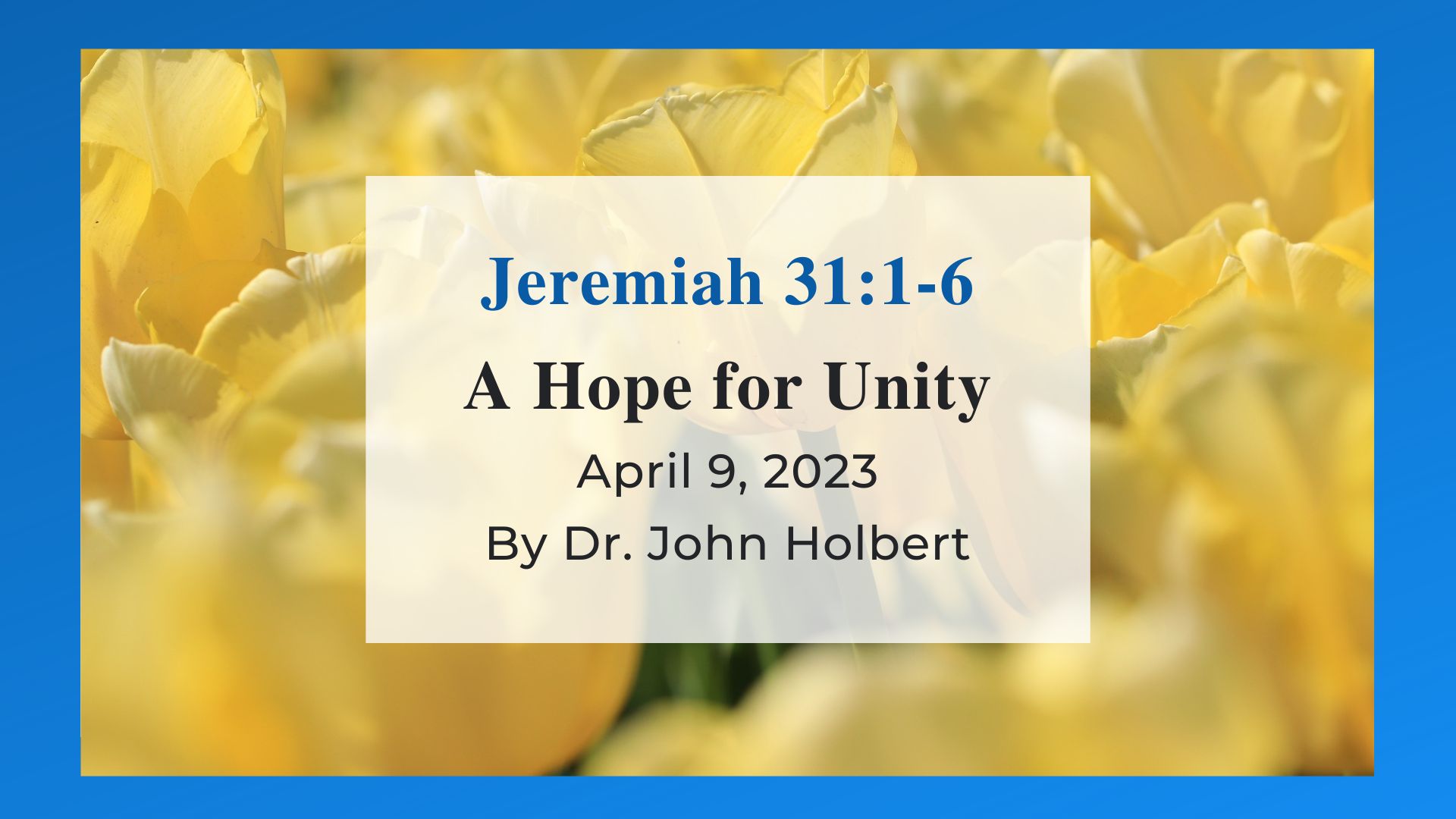A Hope for Unity - Reflections on Jeremiah 31:1-6
by Dr. John Holbert on Monday, April 3, 2023

A Hope for Unity
Jeremiah 31:1-6
The Peripatetic Hebrew Bible Preacher
I have, perhaps surprisingly, preached only one Easter sermon in my entire ministry, among the thousands of sermons I have preached. When I was an associate pastor long ago, the senior pastor had no intention of allowing me, a raw rube, to preach on that highest of days in the Christian year. And because that was the last of my full-time pastoral work, I spent the next 36 years of my life in the halls of academia. My only opportunity for Easter preaching was during one of two interim ministries, the one I served in the spring of 1997. The senior minister of a large downtown Dallas church left his work there at an odd moment, freeing the pulpit for me to preach an Easter word. That was my first and my last such word, and as I have said in earlier essays, it consisted of a retelling of Mark’s account of the Easter event. If I ever had the chance again to preach an Easter word, that would probably be what I would choose to do.
But for those of you who will preach this Easter, and have probably preached on Easter before, I today want to direct our attention to a small and perhaps little-known text from the prophet Jeremiah. I know, of course, that many congregants will come in their Easter finery to hear what one of the gospels has to say about the central event in Christian history, and that any preacher who dares center her sermon in a text from the Hebrew Bible on such a day might offer grounds for intense grumbling or even a call for a change of pastor. Yet, what Jeremiah offers to us—what I will term one of Easter’s most profound calls—is well worth a listen. However, if your eyes are fixed on the New Testament for this day, you may now stop reading my musings about Jeremiah.
To understand what Jer.31:1-6 is specifically about, you must know something about the history of this prophet; if you do not, you will miss the crucial thing he is talking about. Jeremiah was called to prophesy in the 13th year of the reign of King Josiah of Judah, which was the year 627 BCE. We last hear of his prophetic activity from his new Egyptian place of residence, whence he was dragged by fearful disciples sometime after the final destruction of Jerusalem by the armies of Babylon in 586 BCE. Thus, for over 40 years, Jeremiah lived his troubled life under the call of YHWH.
Josiah was a reforming king. When in 622BCE a scroll was discovered in the rebuilding walls of the temple, a scroll that was a significant part of what we know as the book of Deuteronomy, Josiah immediately began a significant and sweeping reform of Judah, demanding that the only true place of worship was Jerusalem, and that all foreign influences in local places of piety were to be destroyed. Jeremiah apparently was in favor of Josiah’s work, and said little during this period. However, after Josiah was killed in a futile attempt to stop the Egyptian army from moving up the coast of Israel in 613BCE, and after one of his sons came to the throne, Jeremiah became very active, finding Josiah’s son unworthy in every way of his father’s mantle.
As you can readily see, Jeremiah was active during a pivotal moment in the history of Israel. He witnessed the hope of Josiah’s reform as well as the decline and eventual destruction of his city and country under a succession of ineffectual kings. Thus, he, no doubt like many of his fellow Judeans, hoped for a future of possibility and, most of all, a future of unity for divided Israel. Since 722 BCE, the northern kingdom of Israel had ceased to exist, obliterated by the armies of Assyria. Judah stood alone among the swirling powers of Egypt to the west and Assyria/Babylon to the east. Surely, YHWH had something brighter in mind for the chosen people!
Thus, Jer.31:1 begins with the central conviction of the hope-filled prophet: “At that time (some future day), says YHWH, I will be the God of all the families of Israel, and they shall be my people.” This sentence recalls clearly the very early promise to the patriarch, Abram, that he would carry the call of YHWH; through him “all the families of the world will be blessed” (Gen.12:3). So it will be again, says Jeremiah. “I have loved you with everlasting love, and have continued my faithfulness to you” (Jer.31:3). Now witness signs of the promised rekindling of the unity of the land. “Again you will plant vineyards on the mountains of Samaria (the former capital of the destroyed Israel) (Jer.31:5). “For there shall be a day when sentinels will call to the hill country of Ephraim (again a reference to northern Israel), ‘Come, let us go up to Zion (the central sanctuary of Jerusalem), to YHWH our God” (Jer.31:6).
The future will bring unity to the severed kingdom of YHWH, when Samaria will once more bloom, and when they will come to Jerusalem, instead of to the ruined Bethel, to worship YHWH. And there, I would suggest, is the hope of Easter, a promise of unity, when human divisions will end, when wars will cease, when partisanship and quarreling will stop, swallowed up in the blinding light of the resurrection of Jesus of Nazareth. Such a resurrection is not merely for Christians, and not merely for those who believe and celebrate the event in one way only. Easter, as the coming day of YHWH outlined by Jeremiah, is for all; it is the hope of the whole world. Happy Easter!
